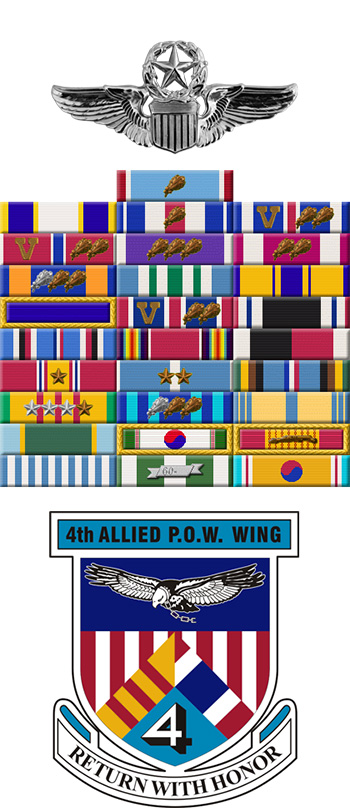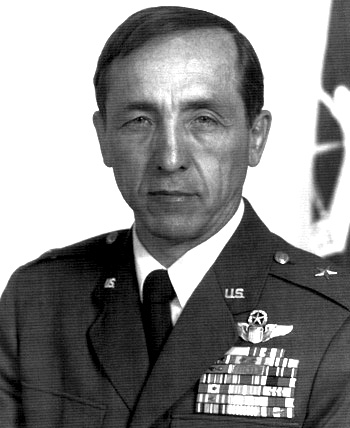
|
James Robinson "Robbie" Risner |
 |
|||
| Rank, Service | ||||
Brigadier General O-7, U.S. Air Force |
||||
| Veteran of: | ||||
|
||||
| Tribute: | ||||
Robbie Risner was born on January 16, 1925, in Mammoth Spring, Arkansas. He enlisted in the Aviation Cadet program of the U.S. Army Air Forces in April 1943, and was commissioned a 2d Lt and awarded his pilot wings at Williams Field, Arizona, on May 23, 1944. During World War II, Lt Risner flew P-38 Lightnings and P-39 Airacobras with the 30th Fighter Squadron at Howard Field in Panama from May 1944 to August 1946. He joined the Oklahoma Air National Guard on August 19, 1946, and was recalled to active duty on February 16, 1951, serving with the 185th Tactical Reconnaissance Squadron in Oklahoma City and at Shaw AFB, South Carolina, until April 1952. Maj Risner deployed to Seoul AB, South Korea, in April 1952, and served with the 15th Tactical Reconnaissance Squadron and then the 336th Fighter Interceptor Squadron during the Korean War from April 1952 to February 1953. During the Korean War, Maj Risner flew 110 combat missions, was credited with destroying 8 Mig-15s in aerial combat, and became the 20th jet ace of the war. He served with the 50th Fighter Bomber Wing at Clovis AFB, New Mexico, from February to August 1953, and then served as operations officer and then commander of the 81st Fighter Bomber Squadron at Hahn AB, West Germany, from August 1953 to August 1956. His next assignment was to George AFB, California, from August 1956 to August 1960, where he served on the staff of the 479th Fighter Defense Wing, was commander of the 34th Fighter Day Squadron, and was commander of the 308th Tactical Fighter Squadron. Col Risner next completed Air War College at Maxwell AFB, Alabama, and then served on the staff of Headquarters Pacific Command at Camp H.M. Smith, Hawaii, from July 1961 to August 1964. He then deployed to Southeast Asia where he served as commander of the 67th Tactical Fighter Squadron at Kadena AB, Okinawa, and then deployed to Korat Royal Thai AFB, Thailand, from August 1964 until he was forced to eject from his F-105 Thunderchief over North Vietnam and was taken as a Prisoner of War on September 16, 1965. After spending 2,707 days in captivity, he was released during Operation Homecoming on February 12, 1973. Col Risner was briefly hospitalized to recover from his injuries at Sheppard AFB, Texas, and then returned to flying status in the F-4 Phantom II with the 4501st Tactical Fighter Replacement Squadron at MacDill AFB, Florida, from July 1973 to February 1974. Gen Risner served as commander of the 832nd Air Division at Cannon AFB, New Mexico, from February 1974 to June 1975, and then served as special assistant to the commander of 12th Air Force at Cannon AFB from July to August 1975. He served as vice commander of the Air Force Tactical Fighter Weapons Center (TFWC) at Nellis AFB, Nevada, from August 1975 to May 1976, followed by service as special assistant to the commander of TFWC from May 1976 until his retirement from the Air Force on August 1, 1976. General Risner was inducted into the Oklahoma Hall of Fame in 1974. Robbie Risner died on October 22, 2013, and was buried at Arlington National Cemetery. His 2nd Air Force Cross Citation reads: The President of the United States of America, authorized by Section 8742, Title 10, United States Code, awards the Air Force Cross to Brigadier General Robinson Risner for extraordinary heroism in military operations against an opposing armed force while a Prisoner of War in North Vietnam from 31 October 1965 to 15 December 1965. During that period the Vietnamese intercepted a series of prisoner messages which clearly indicated the danger of General Risner's leadership to their exploitation methods. He was extensively tortured for information but successfully resisted their demands and established a standard of honorable conduct and resistance which was followed by hundreds of Americans after him. The extremely harsh treatment inflicted upon him was to become a way of life for him in the subsequent years. Through his extraordinary heroism, leadership, and aggressiveness in the face of the enemy, General Risner reflected the highest credit upon himself and the United States Air Force. |
||||
|
||||

